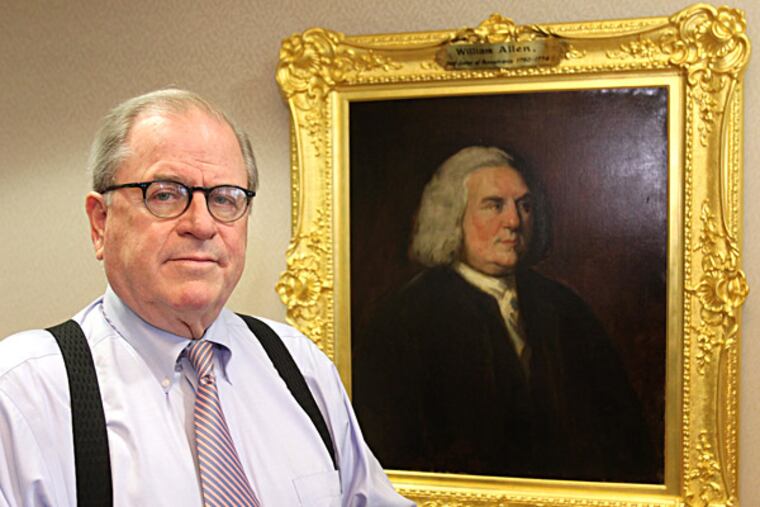Pennsylvania justices vote Castille out as overseer of Philadelphia courts
Riled over the release of a report exposing widespread ticket fixing in Philadelphia Traffic Court, Pennsylvania's Supreme Court justices have voted to remove Chief Justice Ronald D. Castille as the high court's overseer of the city courts.

Riled over the release of a report exposing widespread ticket fixing in Philadelphia Traffic Court, Pennsylvania's Supreme Court justices have voted to remove Chief Justice Ronald D. Castille as the high court's overseer of the city courts.
By a majority vote, his five colleagues instead chose a justice from the Harrisburg area as liaison with the massive court system, sources familiar with the action said Wednesday.
Castille remains chief justice and still wields considerable clout. But his removal as liaison in favor of Justice J. Michael Eakin seems a clear blow to his power and prestige.
The move also comes when Castille has been a driving force in a multiyear effort to overhaul the Philadelphia criminal courts to make sure more cases are decided on their merits.
Castille, who declined to comment about his ouster from the oversight post, launched the reform campaign three years ago. He acted after The Inquirer published an investigative project spotlighting the Philadelphia court system's abysmal conviction rate - among the lowest in America - as well as the system's thousands of fugitives and widespread fear among victims and witnesses.
Most recently, Castille has been pushing to overhaul Traffic Court, which was pilloried in a recent report detailing how tickets were routinely deep-sixed for the well-connected.
The high court has yet to officially announce the shake-up, but the change was detailed by official sources familiar with the high court's action.
Anger among Castille's colleagues at the public release of the ticket-fixing report set the stage for the power play against him, sources said.
His colleagues were reportedly outraged that the report was given to The Inquirer and released to the public without their being able to weigh in on deciding whether it should be made public or deemed an internal document. Castille received copies of the report one day before its contents were detailed in the newspaper.
Since the report was made public 50 days ago, the justices have been silent about its allegations of entrenched corruption at Traffic Court.
The report was prepared by an investigative team headed by William G. Chadwick, a former state inspector general and acting Philadelphia district attorney. For five years, he was Castille's top deputy when Castille was district attorney in the city.
Among other allegations, the scathing inquiry strongly suggested that Justice Seamus McCaffery pulled strings to get a Traffic Court judge to dismiss a ticket issued to McCaffery's wife. McCaffery has denied fixing the ticket.
Castille urged Philadelphia court officials to look into Traffic Court after word broke in 2011 that the FBI had raided it. The federal investigation is ongoing.
Castille, a Republican, and McCaffery, a Democrat and former top Municipal Court judge, are the only Philadelphians on the Supreme Court.
Though Castille and McCaffery have worked closely together in recent years to overhaul the Philadelphia criminal courts, their alliance was always uneasy. Since the release of the Traffic Court report, they have been bitterly at odds.
It's not clear when the justices voted to oust Castille or what the precise vote was. There are now six serving members on the seven-seat court: three Republicans and three Democrats. The seventh justice, Joan Orie Melvin, a Republican, is suspended while awaiting trial on corruption charges.
Castille, 68, who recently announced plans to seek another term next year, began serving as a justice in 1994 and became chief justice in 2008. Under the state Constitution, the justice with the most time on the bench is the chief justice.
He became liaison to the Philadelphia courts 2007, a position that gave him a big say in judicial assignments in the complex system, where 125 judges hear criminal trials, civil lawsuits, all manner of cases dealing with divorce, child abuse, and neglect, crime by juveniles, and more.
The liaison also plays a key role in critical policy decisions, contracts, and patronage in a system with a $100 million annual budget and 1,900 employees.
When he became chief justice in 2008, Castille pointedly held onto the job of liaison to the Philadelphia courts, not delegating it to McCaffery, who joined the court that year.
McCaffery, 62, a forceful personality who has long argued that the court system needed major reform, has made no secret of his desire to serve in the liaison position.
He could not be reached for comment.
Eakins, 64, was the Republican district attorney in Cumberland County before he was elected to Superior Court in 1995. He was elected to the Supreme Court in 2001. He also could not be reached for comment.